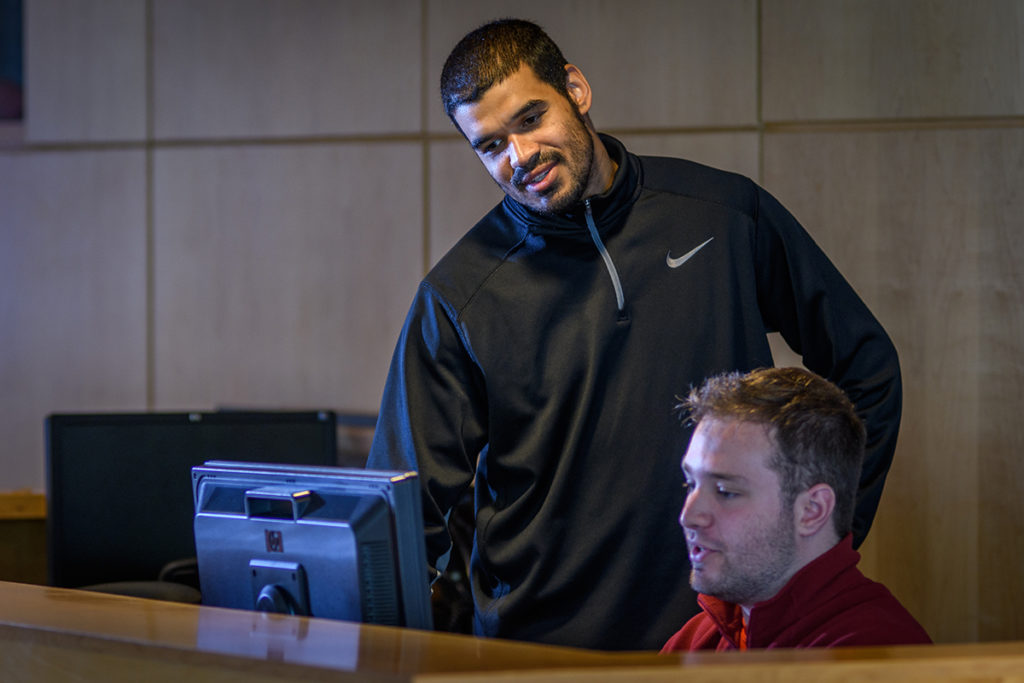For computer crises, Terrance McCormack is the IT guy

You’d think a college campus would be relatively relaxed the week following Commencement. But for Terrance McCormack and his team at Information Technology Services, things are buzzing like an overworked laptop.
“We’re going through quarterly reviews, covering for an absence of student staff, and planning the schedules for our summer employees,” McCormack says during a late May interview.
He’s been at Clark long enough to know the rhythms of the place, especially the fact that the University never truly goes into sleep mode.
McCormack’s path to Worcester was an unconventional one. “I had no real plan,” he says. “I needed a car in the worst way, so I joined the Air Force.” He bought a red 2003 Acura G20, then spent his next 11 years in Florida and Delaware working in administrative support for the Air Force’s health care team.
“For the first two months I was like, ‘This is great. I have no major responsibilities,’” says McCormack. “Then it became, ‘This is awful. I have no major responsibilities.’”
With his work in the health care field he thought a logical next step would be a job as a physician’s assistant, “but the chemistry and science courses weren’t for me.” He began taking political science courses with plans to join his wife as a teacher, but with a growing family, he opted instead to launch a career in technology. He started to train himself on computer systems — a from-the-ground-up challenge. “My only interaction with IT was fixing a printer that constantly broke.”
McCormack came to Clark in the fall of 2015. Today, he estimates that he helps activate devices for 95 percent of all new Clark employees, making him the University’s de facto Welcome Wagon representative. He’s also had to repair coffee-logged laptops, rescue wireless networks, and occasionally relate the unfortunate news that data can’t be recovered. Of course, there are other far less dramatic tasks, like describing how email works or explaining the on-off function.
“Last week I was talking with a student who did everything — and I mean everything — right, but the desktop wasn’t turning on,” McCormack recalls with a grin. “I run across campus, get there, and see that it isn’t plugged in. Honestly, that one’s on me. I should have asked them to check it first.”
It’s simply not his nature to get frustrated at such things. “Usually everyone ends up getting a big laugh. It’s one of those ‘I can’t believe that happened!’ moments.”
McCormack manages a team of nearly 30 student employees. “It’s a great experience working with students. I get to come here every day and watch them plan out their future,” he says. “Their parents obviously did a great job.”
As the father of three, McCormack acknowledges the influence parents have on their children, and he appreciates the work-life balance Clark affords him. “When I’m with my kids, I’m with my kids,” he says. Rarely does he find himself being pulled away from Terrance,
12, Tamyra, 10, and Elijah, 8. The only uncomfortable technology-related conversation McCormack has with his children is when he questions his son’s passion for watching online video game competitions.
“I don’t understand why you’d watch someone play video games when you can just play them yourself,” he says. “I guess this is my ‘get off my lawn’ moment.”
It’s just something he’ll have to learn, like many of us have to learn about phishing attacks and privacy breaches — potential disasters from which McCormack has rescued dozens of Clarkies.
So what do you do when you’re sent a link that sort of looks legitimate, but you’re not sure? “Hover over the link rather than clicking on it,” he advises. “It will save you a lot of pain.”


